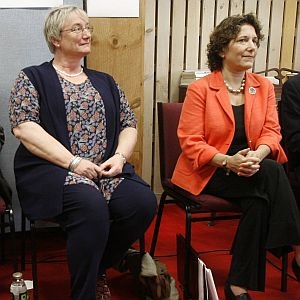After such a hard run and so many wonderful supporters it’s hard to believe that this part is over. While we sure didn’t get the votes we were hoping and working for, we all sure made significant contributions to the process. And I thank each and every one of you for your efforts, good words, sound advice and support.
While we aren’t certain who the winner is, we all know that our next task is to unite behind that person and make sure they win in November. All 5 of us are in agreement that this campaign has been outstanding so far and it remains important for all of us to work the keep this an issue centered campaign. Each candidate brought good ideas to the conversation and now we have the chance to have the winner take the best of all our ideas and move forward with a great plan for Vermonter’s and our future.
It has been such an honor to meet and talk with so many of you all over the state. It is an experience that so few of us get to have, it seems a shame to me we can’t bottle it and share it with all of you. The days are long and the debates have been many, but the energy from all of you to all of the candidates has been what has kept all of us running full steam ahead. I guess this is renewable energy at its best!
I have no idea what I am doing next other than go to Maine for a few days. Then I am happy to come back and help our candidate in any manner they want my assistance. This has just been the first step on the road to victory and I hope all of you will join me in working for a bright future for all Vermonters.
While we aren’t certain who the winner is, we all know that our next task is to unite behind that person and make sure they win in November. All 5 of us are in agreement that this campaign has been outstanding so far and it remains important for all of us to work the keep this an issue centered campaign. Each candidate brought good ideas to the conversation and now we have the chance to have the winner take the best of all our ideas and move forward with a great plan for Vermonter’s and our future.
It has been such an honor to meet and talk with so many of you all over the state. It is an experience that so few of us get to have, it seems a shame to me we can’t bottle it and share it with all of you. The days are long and the debates have been many, but the energy from all of you to all of the candidates has been what has kept all of us running full steam ahead. I guess this is renewable energy at its best!
I have no idea what I am doing next other than go to Maine for a few days. Then I am happy to come back and help our candidate in any manner they want my assistance. This has just been the first step on the road to victory and I hope all of you will join me in working for a bright future for all Vermonters.




